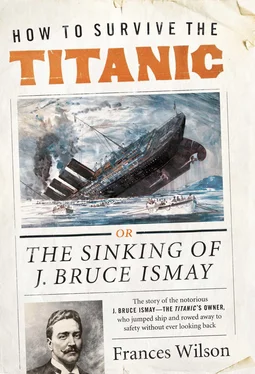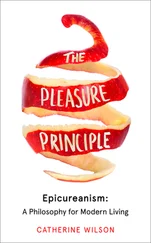Mrs Thayer came to England on several occasions but never saw Ismay again. She spent the rest of her life on the ‘other side’, making contact with her lost husband through her new discovery of mirror-writing.
Chapter 7
THE SUPER CAPTAIN
The isle is full of noises
The Tempest , III, ii
On 2 May 1912, as the Adriatic steamed out of New York carrying Ismay in one of its cabins, the British Board of Trade inquiry into the wreck of the Titanic began in London. The Scottish Drill Hall at Buckingham Gate, armoury of the Scottish Rifles, had been chosen as a venue because it could hold several hundred spectators, most of whom would be, it was anticipated, ladies with time on their hands. Described by the Daily Mirror as resembling ‘a gigantic swimming pool’, the grim building proved too capacious by far; an audience of less than one hundred, including only ten women — of whom one was Virginia Woolf — settled into the galleries for the opening proceedings. Two hundred further seats were taken on the floor by presiding lawyers and pressmen.
Now that the mariners were dry and the narrative was no longer unravelling in real time, interest in the Titanic was beginning to wane. The public had feasted on the tragedy for long enough; the weather was getting warmer and the forthcoming summer promised a brilliant social season. Londoners were looking for distractions, and J. M. Barrie’s gift of a statue of Peter Pan to Kensington Gardens received more press attention than the inquiry’s opening session. The essentials of the wreck were now widely known and the dramatis personae — Ismay, Lightoller, Rostron and Captain Smith — were familiar figures in every household. The US inquiry had been reported in full by the British press; Ismay’s statement of self-defence had been read over breakfast by the whole country and his second examination by Senator Smith had been transcribed in the pages of The Times only the day before. The British inquiry, it was assumed, would be no more than an echo. The assessors would take the script produced by William Alden Smith and dignify it a little, introducing a new interpretation here, a different character-reading there. As it was, the British inquiry added to the mystery of Ismay’s actions one vital scene which had been overlooked by Senator Smith, while they moved another from the margins of the drama to the centre.
Despite the arrival of the assessors in mourning, the inquiry began on a note of triumph rather than tragedy. Sir Robert Finlay, representing the White Star Line, announced in his opening statement that ‘this disaster has given an opportunity for a display of discipline and of heroism which is worthy of all the best traditions of the marine of this country’. The following day, lookout Archie Jewell and Able Seaman Joseph Scarrott gave the first witness accounts on home ground of the wreck of the Titanic to a gallery now containing only one woman and a policeman. Reports of the crew’s statements, described by The Times as ‘thrilling narratives of the last scenes on the doomed ship’, could be found nestling in the heart of the Daily Mirror while the paper’s headlines announced ‘Britain’s First Aeroplane Warship To Take Part in Next Week’s Naval Inspection By the King’.
What had drawn the crowds to the US Senate inquiry was the promise of language unrehearsed and under pressure, of voices betraying their speakers. The US inquiry had proved a conundrum; as the events of the night of 14 April unravelled, the truth became more and more elusive. Nothing made any sense: while everyone told the same story (‘I went to bed, I heard a scraping sound, I went on deck, I got in a lifeboat, I was cold’), no two accounts appeared to agree. Speech became fraught with danger as witnesses tried to steer their answers around the traps placed in their way by William Alden Smith. Sentences subsided, imploded, broke down into babble. Those who had attended the British inquiry in the hope of hearing language at breaking point found that the acoustics of the Scottish Drill Hall were such that they could hear nothing at all. The proceedings, so far from the galleries that they had to be watched through binoculars, were closer to a silent newsreel or a series of lantern slides than a live event. Even the assessors cupped their hands to their ears in order to catch what was said.
The hall, which had been turned into a makeshift court with a great swath of velvet curtain covering up the brickwork, was focused around a witness stand, a twenty-foot model of the Titanic carrying sixteen miniature lifeboats, and a large chart of the North Atlantic. To the right of the witness stand was a dais on which was seated the Wreck Commissioner, Lord Mersey and, at a lower level, his five assessors. Facing Lord Mersey were the other members of the Board of Inquiry, who together made up the sharpest legal minds in the country: the Solicitor-General, Sir Rufus Isaacs QC; Sir Robert Finlay, Liberal Unionist MP for St Andrews and Edinburgh Universities, representing the White Star Line; Thomas Scanlan, MP for Sligo, representing the National Sailors’ and Firemen’s Union; and Clement Edwards, MP for the Welsh mining seat of East Glamorganshire, and representing the Dockers’ Union. A sounding board, resembling an enormous box lying on its side with the lid open, was installed on the dais, but the contraption made little difference. ‘Lord Mersey’s questions to counsel and witnesses’, reported the Daily Mirror, still ‘sounded like whispers.’ The hushed proceedings seemed symbolic of the fact, now increasingly apparent, that the witnesses had very little to reveal about what had happened to the Titanic. As the Mirror put it, ‘in the midst of expectancy, as terrible almost as the silence of that frosty sparkling night on which more than fifteen hundred people went slowly into the depths, there is absolutely no answer to give! There is no answer. There is a pitiful stumbling of words.’
Lord Mersey was not the effete aristocrat the Americans, misled by his title, assumed him to be. The son of a Liverpool merchant, John Charles Bigham, now aged seventy-one, had grown up around wealthy shipowners. His own father’s childhood had been, as he put it, ‘grindingly poor’ and before making his fortune in insurance, Bigham Senior had worked as a clerk in a shipping office. Mersey knew exactly where Bruce Ismay had come from; he had mingled socially with the Ismay family; he dined at the same clubs, he belonged in the same social rank, and in 1905 he had even spoken for Margaret Ismay in a suit she brought against a driver who had crashed into her Panhard-Levassor during a driving holiday in Scotland. Like Thomas and Bruce Ismay, Lord Mersey was a Liberal Unionist who was against Irish Home Rule, and for a brief moment he stepped down from the Bar to represent the Exchange Division of Liverpool in the House of Commons. In his legal career, Mersey had excelled in representing shipping lines and the title he took on his elevation to the peerage was no doubt the one that Thomas Ismay would have chosen for himself had he been similarly honoured. The Mersey was the road to Empire, Liverpool’s golden seaway. He would, Lord Mersey joked, leave the title of the Atlantic itself to one of his esteemed colleagues.
Because the British Board of Trade inquiry into the Titanic was inquiring into its own failings, it was assumed by the public that the procedure would be self-serving and that Lord Mersey had been chosen as Wreck Commissioner because he was an old hand at dodging the issue. Mersey had, reported the New York Times, ‘a record for official blindness to well-known facts’. During his time as an MP, Mersey had cross-examined in the House of Commons inquiry into the role played by the British government in the South African Jameson Raid. When the government was duly cleared, Mersey was so generally regarded as having orchestrated a whitewash that his name became linked with the term. G. K. Chesterton, in an article dramatising the difference between the US and British inquiries, has the Englishman tell the American: ‘I know you and your popular persecutions. You will hunt poor Ismay from court to court, as if he were the only man that was saved — just as you hunted poor Gorki from hotel to hotel, as if he were the only man not living with his wife.’ The American replies: ‘I know you and your gentlemanly privacies and hypocrisies. You will shirk this inquiry just as you shirked the inquiry into the Jameson Raid.’ 1
Читать дальше












